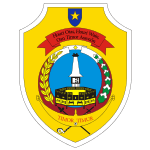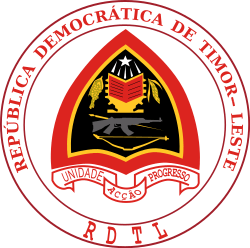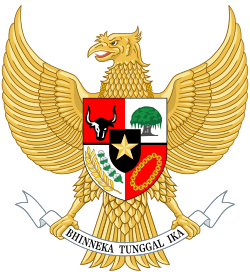East Timor (Indonesian province)
East Timor (Indonesian: Timor Timur) was a de facto province of Indonesia, whose territory corresponded to the previous Portuguese Timor and to the presently independent country of Timor-Leste.
East Timor | |||||||||
|---|---|---|---|---|---|---|---|---|---|
| 1976–1999 | |||||||||
Motto: Houri Otas, Houri Wain, Oan Timor Asswa'in (Tetum) "From the ages past, from today, Timorese warriors" | |||||||||
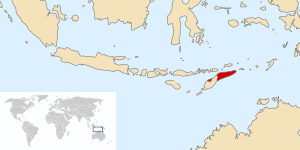 | |||||||||
| Status | Province of Indonesia[lower-alpha 1] | ||||||||
| Capital | Dili | ||||||||
| Official languages | Indonesian | ||||||||
| Recognised regional languages | Balinese, Fataluku, Javanese, Tetum, Sundanese, Uab Meto, other indigenous languages | ||||||||
| Religion |
| ||||||||
| Government | Province within a unitary presidential constitutional republic[lower-alpha 2] | ||||||||
| President | |||||||||
• 1976–1998 | Suharto | ||||||||
• 1998–1999 | Bacharuddin Jusuf Habibie | ||||||||
| Governor | |||||||||
• 1976–1978 (first) | Arnaldo dos Reis Araújo | ||||||||
• 1992–1999 (last) | José Abílio Osório Soares | ||||||||
| Legislature | East Timor Regional People's Representative Council (DPRD Timor Timur) | ||||||||
| History | |||||||||
| 17 July 1976 | |||||||||
| 12 November 1991 | |||||||||
• Independence referendum | 30 August 1999 | ||||||||
• UNTAET established | 25 October 1999 | ||||||||
| Area | |||||||||
| 14,609 km2 (5,641 sq mi) | |||||||||
| Currency | Rupiah (IDR) | ||||||||
| Time zone | UTC+08:00 (WITA) | ||||||||
| ISO 3166 code | TL | ||||||||
| |||||||||
| Today part of | |||||||||
From 1702 to 1975, East Timor was an overseas territory of Portugal named "Portuguese Timor". In 1974, Portugal initiated a gradual decolonization process of its remaining overseas territories, including Portuguese Timor. During the process, a civil conflict between the different Timorese parties erupted. In 1975, Indonesia invaded East Timor and in 1976, it formally annexed the territory, declaring it as its 27th province and renaming it Timor Timur. The United Nations, however, did not recognise the annexation, continuing to consider Portugal as the legitimate administering power of East Timor. Following the end of Indonesian occupation in 1999, and a United Nations administered transition period, East Timor became formally independent of Portugal in 2002 and adopted the official name of Timor-Leste.
Background
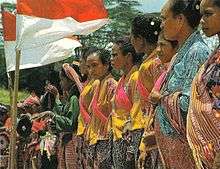
From 1702 to 1975, East Timor was an overseas territory of Portugal, lately being officially the Portuguese overseas province of Timor, usually referred as "Portuguese Timor". Following the "Carnation Revolution" of 1974, the new Government of Portugal initiated a gradual decolonization process of its overseas territories, including Portuguese Timor. During the process, a civil conflict between the several Timorese political parties erupted, with the left-wing Revolutionary Front for an Independent East Timor (Fretilin) prevailing and being able to control the capital Dili, obliging the Portuguese governor and his staff to move his seat to the Atauro Island.
On the 28 November 1975, Fretilin unilaterally declared the independence of the then Portuguese Timor, calling it República Democrática de Timor-Leste (Portuguese for "Democratic Republic of East Timor"). Portugal did not however recognized that independence, with the Portuguese governor continuing to be present and formally administering the province from Atauro, although having a limited de facto authority over the remaining territory of East Timor.
Nine days later, Indonesia began the invasion of the majority of the territory of East Timor. Following the invasion, the Portuguese governor and his staff left Atauro aboard two Portuguese warships. As a statement of Portuguese sovereignty, Portugal maintained those warships patrolling the waters around East Timor until May 1976.
On 17 July 1976 Indonesia formally annexed East Timor as its 27th province and changed its official name to Timor Timur, the Indonesian translation of "East Timor". The use of Portuguese language was then forbidden, as it was seen as a relic of colonisation.
The annexation was recognized by a few countries, the most relevant being the United States and Australia, but was not recognized by Portugal, the majority of other countries and the United Nations. The United Nations continued to recognise Portugal as the legitimate administering power of East Timor.
The Indonesians left in 1999 and East Timor came under the administration of the United Nations.
After the re-establishment of the independence of Timor-Leste in 2002, the East Timorese government requested that the name Timor-Leste be used in place of "East Timor". This is to avoid the Indonesian term and its reminder of the Indonesian occupation.
Governors
- Arnaldo dos Reis Araújo (4 August 1976 – 1978)
- Guilherme Maria Gonçalves (1978–1982)
- Mário Viegas Carrascalão (18 September 1982 – 11 September 1992)
- José Abílio Osório Soares (11 September 1992 – October 1999)
Gallery

Memory of East Timor still remain in Indonesia in the form of East Timor Museum in Taman Mini Indonesia Indah built in 1980, depicted here is its traditional houses.

